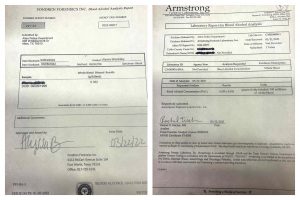Generally speaking, blood is considered the “gold” standard in forensic testing. Many DWI blood test errors occur without anyone in the prosecutor’s office understanding or caring. Please see attached the same blood tested by the State (.36) and an independent retest (.25). Under Texas law both labs have been certified by the Texas Forensic Science Commission to meet blood test admissibility standards. Although the blood is far above the legal limit, this is not the issue. The fact both blood scores are so far apart is scientifically unacceptable. The State always attempts to argue evaporation may account for some small difference. It certainly would not account for such a huge difference. There is a plethora of reasons for such differences. Just to name a few: improper method validation, inaccurate pipettes and diluters, incorrect values for calibrators and controls, improperly labelled samples, SOP lacking in ISO 17205 standards, the list goes on. It is scary judges are not throwing out blood results when machines are not properly validated and the results are unreliable.
DWI blood test errors are scary in that even when found, rarely does it make a difference to a prosecutor or judge. In Texas, you have the right to an independent blood test. If you request one and the officer does not accommodate, this fact that may be used as evidence against the State in trial. Of course, you can have your blood retested at your own expense. The law requires for the blood result to be admissible in court, the lab must be certified and approved by the Texas Forensic Science Commission. My office and I frequently have our clients’ blood retested. The problem is we cannot obtain a true, independent blood test. Only labs which fall under the purview of the Texas Forensic Science Commission qualify for blood admissibility in courts. The Texas Forensic Science Commission has failed to take meaningful steps in several complaints: using improper testing equipment for THC (one expert pointed out using a GC for THC testing may produce false positives due to the derivatization of the sample). Texas DPS labs reported blood results to police departments despite defective test tubes which lacked preservative. Until there is strong accountability in forensics, judges and prosecutors will continue to use the very labs and analysts who are not held responsible for their errors. Absolute power corrupts absolutely. Science can’t be trusted where there is no accountability for errors.

